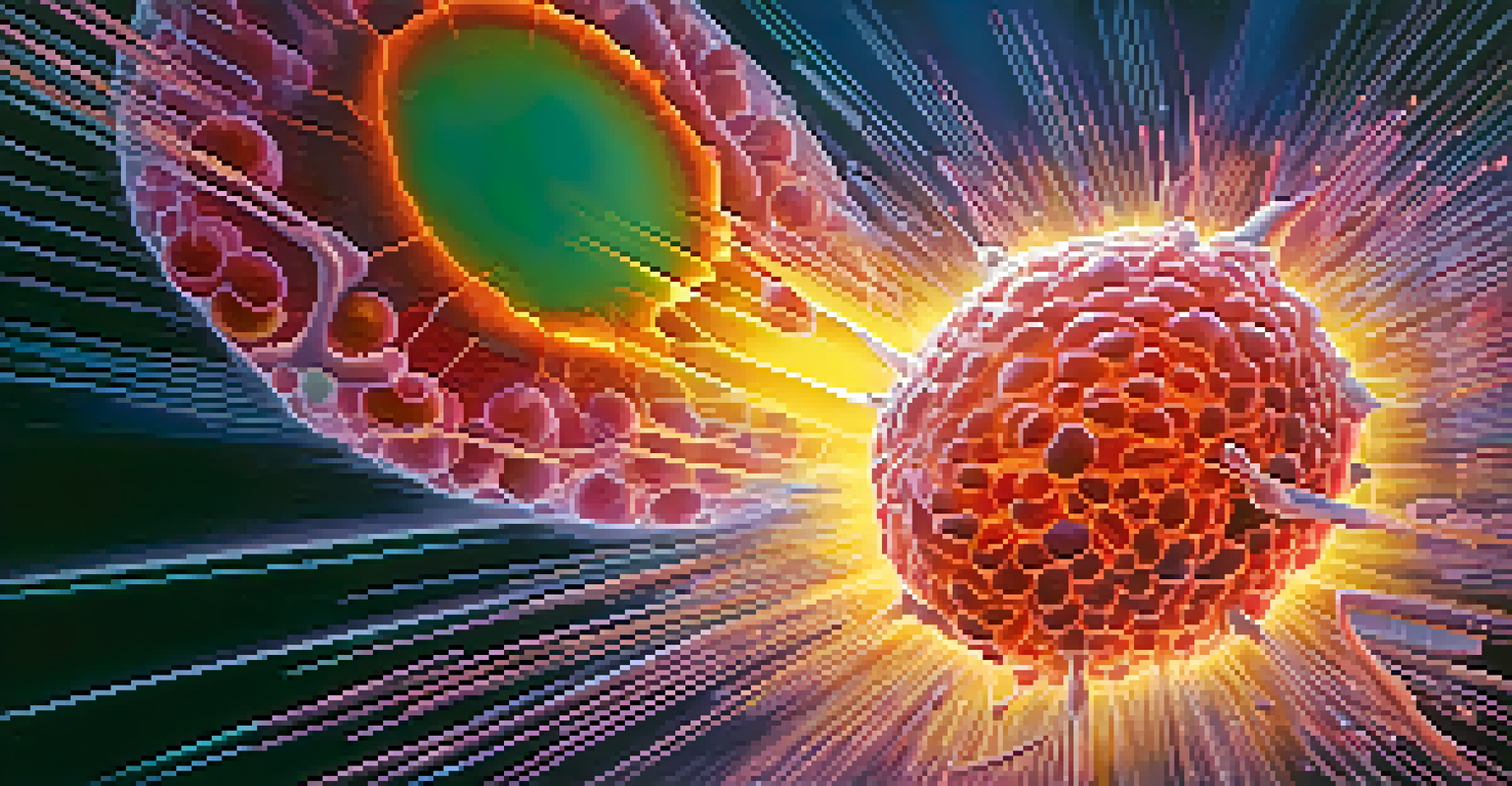Understanding the Different Types of Cancer Treatments Available

What Are the Main Types of Cancer Treatments?
Cancer treatments can be broadly categorized into several types, each tailored to combat the disease in various ways. The main types include surgery, radiation therapy, chemotherapy, immunotherapy, and targeted therapy. Each method plays a distinct role in treatment plans, often working in concert to maximize effectiveness against cancer cells. Understanding these categories is crucial as it sets the foundation for how we approach cancer care.
Cancer is a word that frightens many, but understanding it can empower us to fight back.
Surgery involves physically removing tumors and nearby tissue, which can often provide immediate results in localized cancers. Radiation therapy uses high-energy waves to destroy cancer cells, typically targeting specific areas of the body. Meanwhile, chemotherapy employs drugs to kill rapidly dividing cells, which is effective against various cancer types, albeit with some side effects.
In recent years, immunotherapy and targeted therapy have emerged as innovative options. Immunotherapy empowers the body's immune system to recognize and attack cancer, while targeted therapy focuses on specific genetic markers in cancer cells. This diversity in treatment options allows for more personalized approaches to cancer care, tailoring strategies based on individual patient needs.
How Does Surgery Fit Into Cancer Treatment Plans?
Surgery is often one of the first lines of defense against cancer, particularly when the disease is localized. The primary goal of surgical intervention is to remove tumors and surrounding tissues that may harbor cancer cells. For many patients, successful surgery can lead to a cure, especially if the cancer hasn't spread beyond its original site.

However, surgery isn't always a standalone solution. In some cases, it may be combined with other treatments like chemotherapy or radiation therapy to eliminate any remaining cancer cells. This multi-faceted approach helps reduce the risk of recurrence and enhances the overall effectiveness of the treatment plan.
Diverse Cancer Treatments Available
Cancer treatments include surgery, radiation, chemotherapy, immunotherapy, and targeted therapy, each tailored to combat the disease in unique ways.
It's important for patients to discuss the potential risks and benefits of surgery with their healthcare team. Factors such as tumor size, location, and overall health play crucial roles in determining whether surgery is a viable option. Ultimately, the goal is to create a comprehensive plan that addresses the unique aspects of each individual's cancer journey.
The Role of Radiation Therapy in Treating Cancer
Radiation therapy is a powerful tool in the cancer treatment arsenal, using high-energy particles to target and destroy malignant cells. This type of therapy can be applied externally, through machines that direct radiation beams at the tumor, or internally, via radioactive materials placed inside the body. It plays a crucial role in shrinking tumors and alleviating symptoms in advanced cancer cases.
The best way to predict the future is to create it.
One of the significant advantages of radiation therapy is its precision. Advances in technology have allowed for more targeted treatments, which minimizes damage to surrounding healthy tissues. This is particularly important since many cancer patients are already dealing with the side effects of their illness and other treatments.
Patients often undergo radiation therapy in conjunction with surgery or chemotherapy to improve outcomes. It can be a primary treatment for some cancers, while for others, it serves as an adjunctive measure to prevent recurrence. Understanding how radiation fits into the broader treatment landscape is key for patients navigating their cancer journey.
Understanding Chemotherapy and Its Impact
Chemotherapy involves using powerful drugs to combat cancer by targeting rapidly dividing cells. This method is effective not only against cancerous cells but also affects other fast-growing cells in the body, leading to common side effects like nausea and hair loss. Despite these challenges, chemotherapy remains a cornerstone of cancer treatment, particularly for aggressive or widespread cancers.
Patients often receive chemotherapy in cycles, allowing time for recovery between doses. This approach helps reduce toxicity and improve the body's ability to fight cancer. The specific regimen can vary widely based on the type of cancer, its stage, and individual patient factors.
Surgery's Key Role in Cancer Care
Surgery is often the first line of defense against localized cancer, aiming to remove tumors and surrounding tissue for potential cure.
It's essential for patients to have open conversations with their healthcare team about what to expect during chemotherapy. Understanding potential side effects and treatment goals can help patients prepare mentally and physically, making the process more manageable. Many support resources are available to assist patients during this challenging time.
Exploring Immunotherapy: A New Frontier in Cancer Care
Immunotherapy represents a groundbreaking shift in cancer treatment, harnessing the body's immune system to identify and attack cancer cells. Unlike traditional treatments, which directly target cancer, immunotherapy aims to enhance the immune response, leading to a more natural fight against the disease. This innovative approach has shown promise in treating several types of cancer and is continually evolving.
There are various types of immunotherapies, including checkpoint inhibitors, CAR T-cell therapy, and monoclonal antibodies. Each type works differently, but all share the common goal of enabling the immune system to better recognize and eliminate cancer cells. This has opened new avenues for patients, especially those who may not have responded to conventional treatments.
While immunotherapy can be highly effective, it also comes with its challenges, including potential side effects related to immune system overactivity. Patients considering immunotherapy should discuss the pros and cons with their healthcare providers to ensure they understand the potential benefits and risks involved. Continuous research and clinical trials are helping to refine and expand immunotherapy options, making it a key focus in cancer treatment.
What is Targeted Therapy, and How Does It Work?
Targeted therapy is a nuanced approach to cancer treatment that focuses on specific molecular targets associated with cancer. By identifying the genetic mutations or proteins that drive cancer growth, targeted therapies can more precisely interfere with these processes. This method contrasts with chemotherapy, which affects all rapidly dividing cells, thus reducing collateral damage to healthy tissues.
One of the significant advantages of targeted therapy is its ability to minimize side effects while maximizing efficacy. Patients often experience fewer adverse reactions compared to traditional chemotherapy, leading to an improved quality of life during treatment. This type of therapy is particularly effective for cancers with known genetic markers, allowing for personalized treatment strategies.
Future of Personalized Medicine
Advancements in research and technology are paving the way for personalized cancer treatments that are more effective and minimize side effects.
It's essential for patients and healthcare providers to work together to determine if targeted therapy is a suitable option. Genetic testing can reveal whether a patient's cancer has specific targets that can be addressed with this approach. As research progresses, more targeted therapies are being developed, creating a tailored landscape of options for cancer patients.
Integrative Approaches: Complementing Cancer Treatment
Integrative approaches to cancer treatment emphasize the importance of combining conventional medical care with complementary therapies. This holistic perspective acknowledges that cancer affects not just the body but also the mind and spirit. Practices such as acupuncture, yoga, and nutrition support can play a vital role in enhancing overall well-being and quality of life during treatment.
Many patients find that integrative therapies help manage side effects from conventional treatments, reduce stress, and improve emotional resilience. For instance, mindfulness practices can aid in coping with anxiety, while nutritional support can bolster the body's strength and immune function. It's about creating a comprehensive care plan that addresses the whole person.

However, it's essential to discuss any integrative therapies with healthcare providers to ensure they complement the primary treatment plan rather than interfere with it. As the understanding of cancer evolves, so does the recognition of the importance of treating patients as multifaceted individuals, paving the way for a more compassionate approach to cancer care.
The Future of Cancer Treatment: What Lies Ahead?
The future of cancer treatment is bright, with advancements in research and technology paving the way for more effective and personalized therapies. Innovations like gene editing, advanced immunotherapies, and artificial intelligence in treatment planning are all on the horizon. These developments promise to revolutionize how we understand and tackle cancer, offering hope to millions globally.
Clinical trials play a crucial role in this evolution, as they test new treatments and refine existing ones. Patients participating in clinical trials can access cutting-edge therapies, often before they become widely available. This not only contributes to personal health but also advances the collective knowledge of cancer treatment.
As we look ahead, the emphasis will likely shift toward personalized medicine, tailoring treatments to individual genetic profiles and specific cancer characteristics. This approach aims to maximize effectiveness while minimizing side effects, ultimately leading to better outcomes for patients. The journey of cancer treatment continues to evolve, bringing hope and innovation into the realm of cancer care.